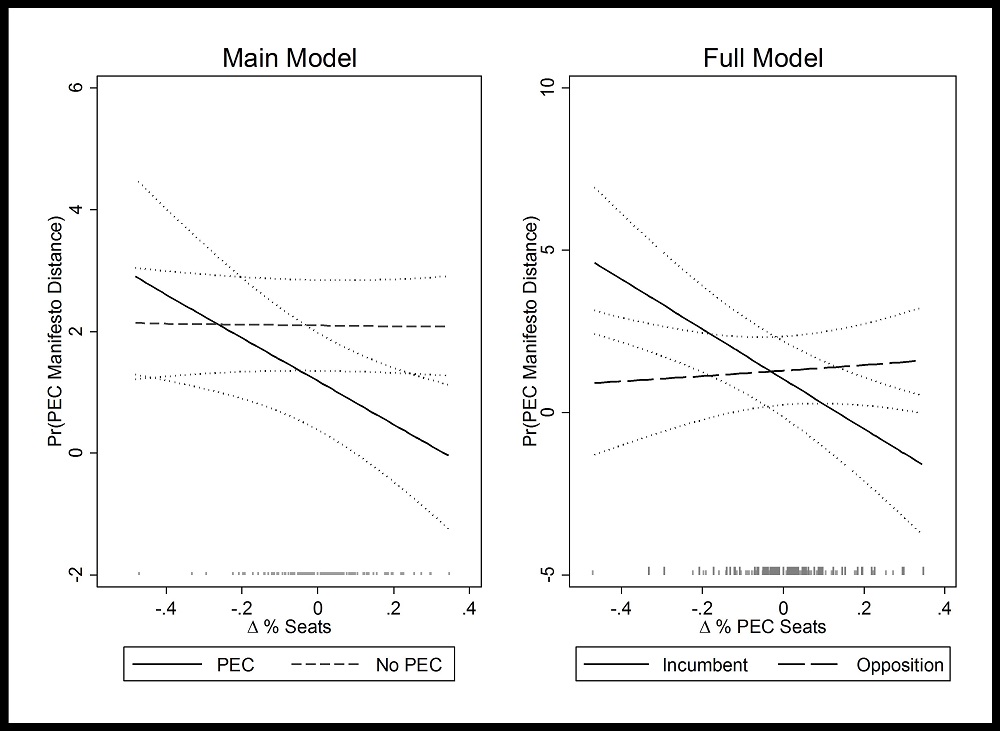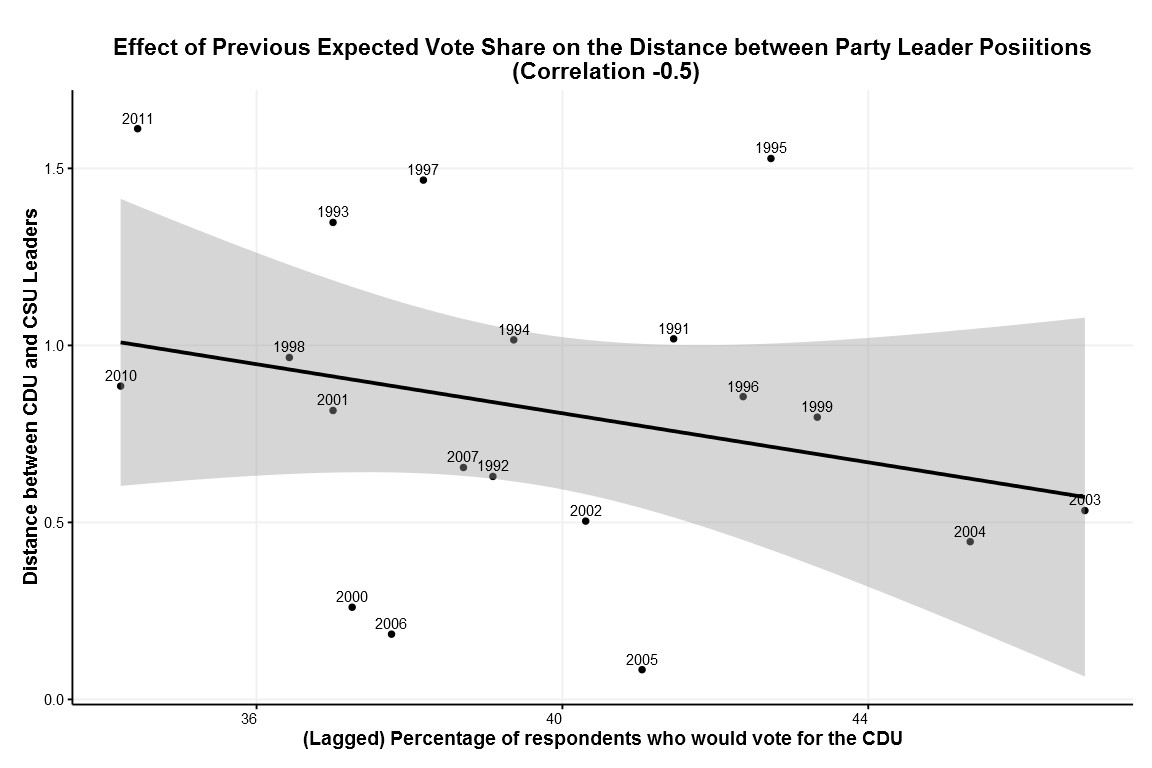While most coalition governments form after the results of an election, some parties choose to announce their intention to form pre-electoral coalitions before a vote has been held. Based on a recent study, Zachary Greene and Matthias Haber explore why parties, which are usually in direct conflict with one another for electoral support, choose to engage in this kind of cooperation. Their findings highlight that close competitors can often use their electoral context to mutual advantage and that parties do not always benefit from strictly adversarial approaches.
Popular news reports abound with evidence that parties and politicians construct their campaign messages and manipulate rules and procedures to undercut their competitors. Yet, electoral conditions often create incentives for parties to coordinate election strategies.
Parties with geographically or ethnically defined bases of support such as the CSU in Germany or the SNP in the United Kingdom dominate regional elections, but cannot possibly control national governments on their own. In other cases, single member districts or multiple rounds of voting as in France lead to multiple ideologically close competitors in the same electoral districts with little chance of winning the constituency unless the competitors agree to cooperate.
In these contexts, parties face competing incentives for collective action and must seek out and cultivate partnerships with other parties to win elections and participate in government. The SNP’s dominance in Scotland, for example, has essentially ensured that Labour will face challenging electoral mathematics to form a majority government in Westminster without the Scottish party’s support.
Scholars have only just begun to study the prevalence and logic of these so called ‘pre-electoral coalitions’ between parties, although many questions about their function and maintenance remain unanswered. For example, when do these parties tie their policy statements, but not their organisations? Does long term participation in these pre-electoral coalitions, such as in the case of sister parties, affect the positions and functions of intra-party politics?
In line with our recent study of pre-electoral coalitions and party preferences, we argue that parties’ likelihood of formulating similar policy positions depends on the past electoral success of pre-electoral coalitions. Parties craft more ideologically similar electoral campaigns with other parties when they have jointly benefitted from more parliamentary seats in the last election. In turn, when this approach causes parties to jointly lose seats, parties will distinguish their goals by developing election statements with divergent positions. Although this mechanism is potentially at work for parties in a range of settings, it is likely most responsive for parties engaged in pre-electoral coalitions.
Cross-national analysis
To investigate this perspective, we have performed two sets of analyses aimed at exploring the relationship between parties’ collaboration, past electoral success and their policy positions. Together, these tests are designed to demonstrate the theory’s broad applicability with a cross=-national examination of party cooperation and the study’s internal validity through the study of an important and well-known case.
In the main analysis, we use parties’ success at winning parliamentary seats to predict the relative distance between parties’ preferences on the economic left-right dimension of conflict in a broad selection of elections in 20 democracies over nearly 50 years. We measure ideological distance using parties’ left-right preferences as coded from content analysis of parties’ election manifestos (see the Comparative Manifestos Project).
In a second analysis, we conduct an in-depth case study of a set of sister parties: the German CDU and CSU. Using automated content analysis (WORDFISH), we estimate ideological positions of party leaders and the rank and file members based on a new data set of speeches that members from both parties gave at their party’s national congresses over the last 20 years. We use these estimates to explore how changes in public opinion of the CDU and CSU impact the relative ideological distances staked out by the party leaders and party congress attendees (see here for a similar approach).
We present the results from a regression analysis predicting the ideological distance between two parties in Figure 1. In particular, we show the predicted effect of two parties engaged in a pre-electoral coalition (PEC) and changes to their combined seat shares in the lower house of parliament in the last election on their relative ideological positions. The first panel in Figure 1 shows the effect for all pre-electoral coalitions, whereas the second panel illustrates the effect for pre-electoral coalitions conditioned by their government participation. Both panels reveal support for the theory, although the effect for all pre-electoral coalitions, not accounting for government participation, in Figure 1 is only weakly statistically significant at the 90% level. The predicted effect in the second panel is statistically different from zero and quite strong; as the pre-electoral coalition’s parliamentary seat share increases, the parties decrease their distance on a left-right ideological dimension.
Figure 1: Results of the analysis

Note: For more information, see the authors’ recent paper in Party Politics.
The cross-national data demonstrates evidence consistent with our hypotheses as shown in Figure 1. Parties in pre-electoral coalitions respond to their recent electoral successes in developing their electoral campaigns. Yet, to what extent does this explain parties with long term relationships such as the German sister parties, the CDU and the CSU? In a secondary analysis, we use an automated scaling model to estimate change in the parties’ positions on a yearly basis from 1990-2010 (see here for the details). Figure 2 shows the bivariate correlation between these positions and the parties’ public opinion. The results highlight the primary mechanism. When the parties are jointly more popular they move their positions closer, but distinguish their goals more when they expect less electoral benefit.
Figure 2: Effect of previous expected vote share on the distance between party leader positions

Note: For more information, see the authors’ recent paper in Party Politics.
Altogether, this evidence offers clear support for our perspective. Even in the extreme case of sister parties, the substance of parties’ electoral collaborations reacts to their past electoral success. This perspective suggests that ideologically close competitors can use their electoral context to mutual advantage. Parties do not always benefit from strictly adversarial approaches. Cases of electoral coordination such as the Gauche Plurielle in France or sister parties in Germany may offer examples for how parties can work together to advance their electoral goals while maintaining distinct ideological profiles. Parties such as Labour and the SNP in the United Kingdom or parties in other contexts may benefit electorally from explicitly considering ways they could coordinate or reduce the barriers to collective action in ways that lead to mutually beneficial policy and governing outcomes.
For more information on this topic, see the authors’ recent articles in Party Politics and the British Journal of Political Science
Please read our comments policy before commenting.
Note: This article gives the views of the authors, and not the position of EUROPP – European Politics and Policy, nor of the London School of Economics.
_________________________________
 Zachary Greene – University of Strathclyde
Zachary Greene – University of Strathclyde
Zachary Greene is a Chancellor’s Fellow and Lecturer at the University of Strathclyde (Glasgow, Scotland). His work on intra-party politics, party preferences and government behavior have appeared in journals such as the British Journal of Political Science, Electoral Studies, the European Journal of Political Research, the European Political Science Review, the Journal of European Public Policy, Party Politics and State Politics and Policy Quarterly.
 Matthias Haber – Hertie School of Governance
Matthias Haber – Hertie School of Governance
Matthias Haber is a post-doctoral researcher scientist at the Hertie School of Governance in Berlin and the head of the Governance Indicators Unit. His research on intra-party politics, electoral & legislative behavior, and political methodology has appeared in the British Journal of Political Science, Electoral Studies, and Research & Politics.





